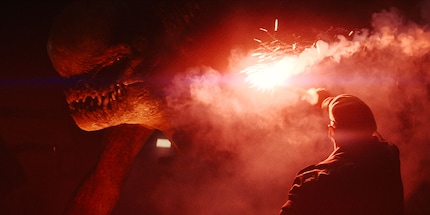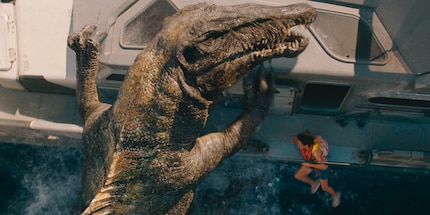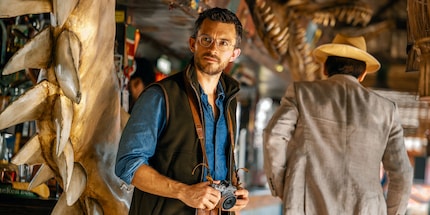
Review
The Running Man: entertainment instead of alarm bells
by Luca Fontana

After laser raptors and locust horror, Jurassic World: Rebirth dares to venture off the beaten track. It’s not a milestone, but perhaps just a sign that there’s still some life in the series. And proof that less can be more.
This movie review contains no spoilers. Everything mentioned here has already been revealed in trailers. Jurassic World: Rebirth hits cinemas on 2 July.
I sometimes wonder whether Jurassic Park was never really an adventure movie but more of a secular creation story. Except that God was an entrepreneur with delusions of grandeur who believed that miracles could be planned like amusement rides. Instead of using clay, he formed life from DNA extracted from mosquitoes that had been trapped in amber for millions of years. And instead of resting on the seventh day, he opened the gates to a theme park.
Welcome to Jurassic Park, he said.
This sentence is still so powerful today because it touches on something unspeakable: the longing for control over things we’re never meant to control. That’s why it’s so frustrating that the franchise has forgotten its own subtext in recent decades. That ethics have been turned into a ruckus. Awe into spectacle. Dinosaurs into toys...
And now we have Jurassic World: Rebirth. A movie that isn’t trying to reinvent the wheel, but wondering why it’s stopped turning and how it could be given a boost. Did it succeed in doing so?
Before I can talk about Jurassic World: Rebirth, I need to take a step back. Back to that moment in the movie theatre that changed everything in 1993.
It wasn’t only the groundbreaking technology, or the lifelike dinosaurs. And it wasn’t just the direction of Steven Spielberg, who knew how to build suspense before delivering it. What made Jurassic Park a milestone was the feeling that something sacred was being touched. Something deeply dangerous.
The movie focused on amazing its audience, that’s for sure. But it didn’t portray the creatures as monsters, but as animals. Living beings with authority, with personalities, with dignity. Catching that first glimpse of the brachiosaurs was a revelation. Even the T-Rex’s debut wasn’t all about brute force, but about atmosphere. I’m sure you remember. The shaking glass of water. The unsteady camera. Darkness. Terror. Rain.
Eyes glowing red.

But there was more to the movie than amazement. Jurassic Park was steeped in a moral question that resonated in every scene: what does it mean to create life just because you can, but without asking whether you should? In addition, it featured characters who were far more than plot vehicles. Malcolm, Grant, Sattler: they were the embodiment of attitude. The sceptic. The pragmatist. The researcher.
All of them made the audience feel that something was well out of balance. And that’s exactly what made the movie so appealing outside of the monster B-movie realm. It was an analogy about progress without control. Curiosity without responsibility. Knowledge without wisdom. And capitalism without limits. Because, as Michael Crichton wrote in the original novel, no sacrifice is too great not to be made – as long as someone pays for it.
«Life... uh, finds a way», is how Ian Malcolm summarised the whole scope of this story.
The more the franchise grew, the weaker its impact became. A movie about miracles turned into a series about hazard management and laser-targeting superraptors (no kidding). The question, «What have we done?» gave way to «What’s the next thing our raptor will do?» And the grand finale of Jurassic World: Dominion wasn’t even about dinosaurs, but about prehistoric locusts.
You read right, locusts.

The tide seems to be turning with Jurassic World: Rebirth. At least a bit. What can I say, the seventh (!) part of the franchise is still no moral masterpiece that can even come close to the original. But at least it’s asked the right question: how do we regain the qualities of the original?
It starts with a pleasantly simple plot and a moral dilemma. There’s a forbidden island, three rare dinosaurs whose DNA is worth its weight in medical gold – and a pharmaceutical company that wants to secretly cash in on this. People aren’t allowed to set foot on the island for good reasons. At the same time, a family sailing around the world becomes stranded in this very place. That’s all it takes to set a story in motion that doesn’t aim to change the world, but simply wants to tell the story of an adventure turned bad.
Gareth Edwards, who’s a fan of the original himself, has directed Rebirth with the same signature style so typical of Godzilla (2014), Star Wars: Rogue One and The Creator. Namely, by telling a tale of gigantic creatures from the perspective of smaller ones. His camera often remains close to the ground, observing incomprehensible goings-on from human height. There are no orchestrated effects from a bird’s-eye perspective, but astonishment wearing shoes caked in mud.
And when the new T-Rex finally rears its head for the first time, it doesn’t feel like a cheap copy, but like the most spectacular and best staged action scene in the entire franchise. There’s a glimpse of a shadow along the edge of a forest. Waves in the riverbed. The sound of breaking branches in the background. And then nothing. No music. Just breathing, uncertainty and silence before all hell breaks loose on the characters.
It’s this kind of scene that makes Rebirth stand out and brings it closer to the original than any homage ever could.
The decision to shoot Rebirth on analogue Kodak film, as used to be the norm in the 80s, pays off in every frame. The images are warm, slightly grainy, with colours that smell more of earth and foliage than a green screen ever could. The images breathe. They look like they’ve stepped out of an era that might have been somewhere between Jurassic Park and The Lost World, but are somewhat clearer, denser and more deliberately composed.
It’s especially in landscape shots that the film unfolds its full effect: a lush green jungle, moss-covered trees, light that pierces through leaves like sunspots on a forgotten photograph. Combined with the real sets and real locations used for this movie, this creates a feeling of authenticity that many predecessors lacked. There’s no over-the-top storm of effects, but a visual experience that dares to be natural again in the best sense of the word.
The film’s soundtrack doesn’t disappoint either. Alexandre Desplat respectfully, but confidently draws from great John Williams scores. He’s added his own accents, which can feel threatening, melancholy or majestic. The soundtrack doesn’t simply cater to the images, it adds to them.
In moments like these, Rebirth feels more like good old Jurassic Park than ever before.
What about the characters? They’re definitely Rebirth’s weakness. Plot-wise, the movie family feels two-dimensional and superfluous. Mahershala Ali plays his part with stoic calm, while Scarlett Johansson gets off to a solid start. In the end, however, they remain just as flat and boring as Chris Pratt and Bryce Dallas Howard did before them.
Only Jonathan Bailey, who plays palaeobiologist Henry Loomis, brings back something that felt like ancient history: genuine enthusiasm. The perspective of a researcher who’s waited his whole life for this moment and acknowledges it with awe and respect, rather than a just a witty comment.

But as successful as the structure, pace and atmosphere are in the first two thirds Rebirth loses itself in its own setting and pretty much blows everything in the final act.
The plot heads towards a showdown that never really materialises. Having said that, the film raises some exciting theories. For example, that it’s not intelligence but luck that determines the survival of a species. Dinosaurs may not have been particularly clever, but they survived for hundreds of millions of years. Humans, on the other hand? Highly intelligent, yes. But also self-destructive. We’re unlikely to break the million-year mark before we become extinct.
But the movie does absolutely nothing with this mind game. Nor with the moral dilemma around exclusive, overpriced medicine. Instead of escalation, the finale feels strangely neutral. Important questions remain unanswered, and even a central decision made by a character isn’t really pursued either. And when the credits start to roll, it feels like someone forgot to write the last act.
So what was the vibe when the lights came back on in the movie theatre? Not disappointment, but more like an unimpressed shrug. Jurassic World: Rebirth – a step in the right direction, but not a big one. The film has remembered to include elements that made the franchise once so special: amazement, excitement, atmosphere. But when it comes down to it, this instalment lacks teeth. There’s no true finale, no cathartic resolution, no memorable moment.
I feel it all would’ve been possible. There was something dormant there that wasn’t fully unleashed. Rebirth proves that the franchise can be kept alive as long as it’s not smothered by blockbuster greed. Maybe that’s more than I could’ve hoped for after having endured plagues of locusts and laser raptors.
I write about technology as if it were cinema, and about films as if they were real life. Between bits and blockbusters, I’m after stories that move people, not just generate clicks. And yes – sometimes I listen to film scores louder than I probably should.
Which films, shows, books, games or board games are genuinely great? Recommendations from our personal experience.
Show all